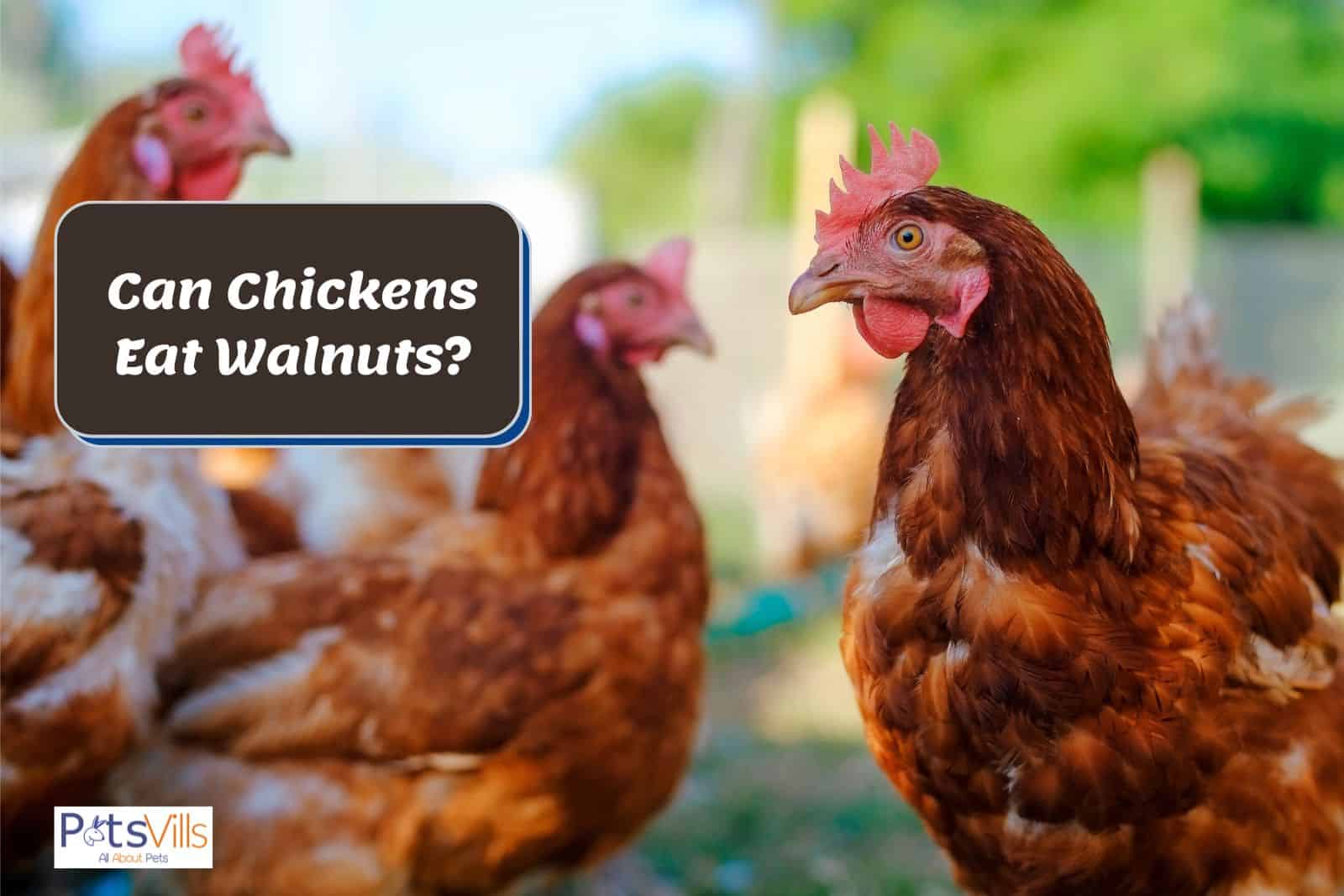Are you absorbed in the can chickens eat walnuts question?
I was guilty as charged until I discovered what Bob ― our local chicken expert ― had to say:
Yes, chickens can eat walnuts.
A perfect treat and crunchy, these nuts are a chicken’s joy ― rich in protein, fiber, and other nutrients.
That’s not all ― If you want to know everything about walnuts and chickens, keep scrolling…
Table of Contents
Key Takeaways
- Walnuts are rich in nutrients and safe for your chickens to eat.
- Beware of overfeeding this nut. Though walnuts pack a tremendous nutritious treat, your chickens still need their chicken feeds for optimal nutrition.
- The only way to feed walnuts: crack its shell and carve out the inside. It’s THAT easy.
Is It Healthy For Chickens To Eat Walnuts?
Walnuts are a popular fruit during the fall season. They are great fresh or in pies and other delicious desserts ― for humans, of course.
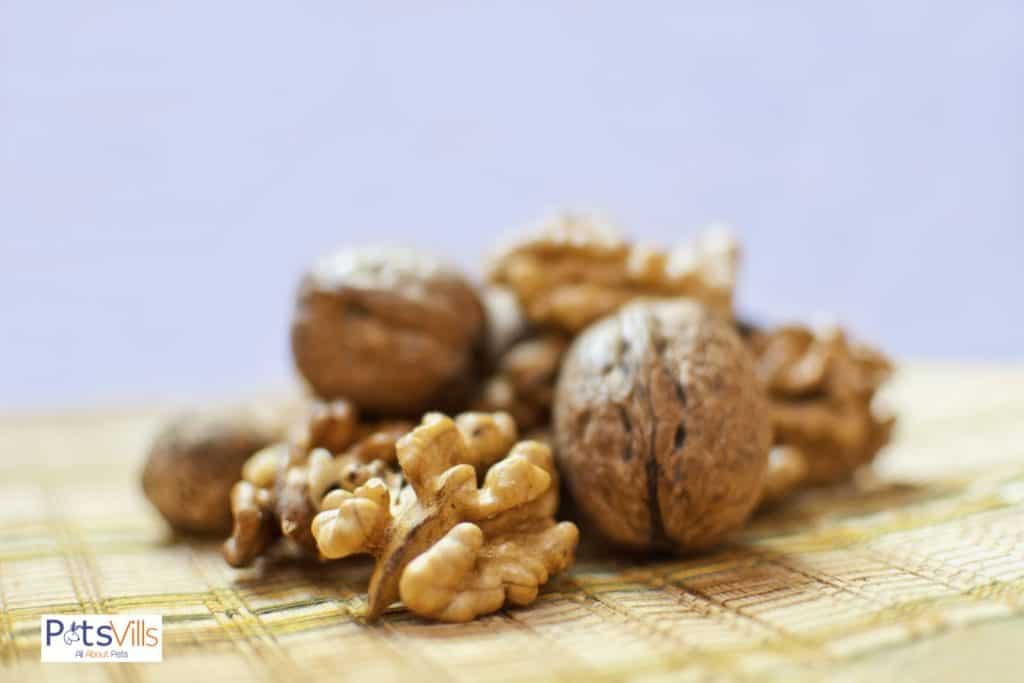
According to nutrition scientist Atli Arnarson BSc, Ph.D. : “These nuts are rich in omega-3 fats and contain higher amounts of antioxidants than most other foods.” [1].
But you’d be amazed to hear that your chickens can also benefit:
Walnuts are a good source of healthy fats, protein, and fiber. With their high nutrition content, it’s fit for chickens, and walnuts can help boost their nutrition intake [1].
1. Vitamins
Walnuts contain a lot of vitamins that help the chicken body function properly. Some of the vitamins are A, B-complex, C, and K.
Vitamin A is essential for maintaining the overall health of the chickens. It also helps the egg-laying chickens produce quality eggs.
Vitamin C helps support the immune system, maintain healthy bones, and keep the skin and feathers healthy. These vitamins also help cuts and wounds heal quicker as well.
As for vitamin K, chickens don’t need them, but they are essential for healthy blood and bone.
2. Minerals
Besides vitamins, chickens also need minerals for their body to function correctly and stay healthy.
Walnuts are high in calcium content and essential for strong bones and healthy eggs.
Other minerals in the walnuts, such as copper and magnesium, will keep your chicken’s digestive system healthy.
3. Fibers
Walnuts are rich in fiber. It is vital to the chickens’ health and should make up 10% of your chicken’s daily diet.
Fiber boosts healthy gut bacteria production, improves bowel movement, and regulates blood sugar levels.
To tickle your new interest, I’ve provided some clever benefits of walnuts in this YouTube clip:
Discover the nutritional value and the best ways to serve spinach to your chickens in our comprehensive article ‘Spinach for Chickens‘!
Can Chickens Eat Walnut Leaves?
If you’ve asked, “can chickens eat walnuts?” you’ve also wondered,” what about the leaves?” Let me quickly tell you a secret:
The walnut leaves don’t contain any toxins and are safe for the chickens to eat. Most of the time, the chickens will not eat the leaves. Why not?
Because fresh leaves are too harsh for your chickens to tear and eat.
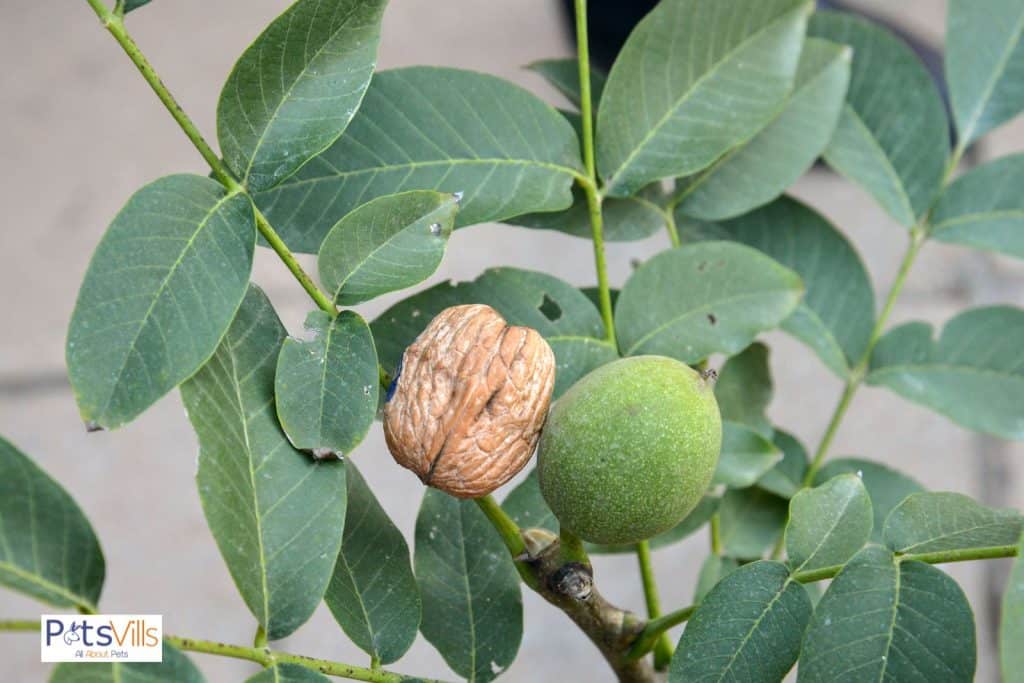
They’ll first try pecking at it and then leave it alone after they’re tired of losing.
Interestingly, these leaves offer some medicinal benefits for chickens:
If the chickens are bothered by digestive problems such as diarrhea or digestive tract inflammation, these leaves can sort out these obnoxious problems.
Are Walnuts Toxic For Chickens?
You know Bertie down the street loves to gossip, don’t you?
As such, many rumors are floating online claiming walnuts are toxic for chickens.
Go ahead and let out your sigh of relief, knowing that this rumor is inaccurate: walnuts do not contain any toxins or harmful substances.
When the walnut is ripe, it will drop from the tree and lay on the ground. From there, it will ripen further and begin to split open.
The walnut’s flesh, now exposed to air, attracts that green stuff you see on your morning loaf of bread ― called mold.
The mold causes the walnut to become toxic and can harm the chickens [2].
Moldy walnuts can cause an upset stomach, diarrhea, and other digestive problems.
So, to prevent them from falling sick from mold, feed only the fresh walnuts to your chickens.
If you’re a chicken owner looking to incorporate more fruit into your chickens’ diet, be sure to check out our article “Can Chickens Eat Mangoes?”. You’ll learn all about the potential benefits and any precautions you should take when offering this tasty tropical fruit to your feathered friends!
How To Feed Walnuts To Chickens
Feed walnuts to the chickens. There’s only one method: crack the shell open and remove the insides.
Once you got these goodies, feed them to your chickens ― it’s that simple!
You can give them the entire pieces or break them into smaller ones.
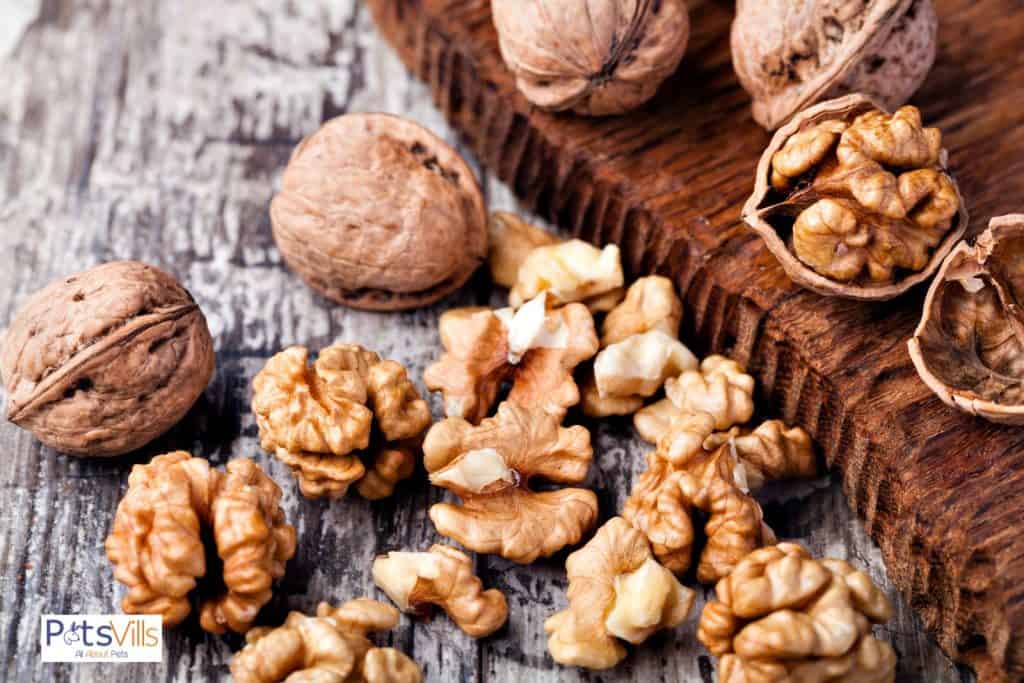
To do this, put the walnuts onto your feeder or mix them with their feeds.
Adding walnuts to their feeds will give your chickens added nutrition to their food.
Once you remove the flesh, throw away the shell. If you don’t do this, your chickens can choke.
So please keep your chickens away from these sharp edges!
How Much And How Often To Feed Walnuts To Chickens
Feeding these walnuts in moderation and only as a treat. Besides, These types lack adequate nutrition and won’t serve as a staple food.
That’s why you have commercial feeds. These feeds are formulated with the correct amount of nutrition to help keep your chickens healthy and strong.
So, if you stick with your walnut routine a couple of times a week, your chickens will have plenty of these treats.
For better nutrition, I suggest you serve other treats, such as bananas, apples, and blueberries, to your chickens.
You don’t have to worry about how many walnuts you can feed them because there aren’t any limitations. Yet, be careful with going overboard!
If you do, they may stop eating their staple food of, commercial feeds of, commercial feeds.
Generally, walnuts and other treats should make up only 10% of their diet. The rest should come from commercial feeds.
Get the facts on the health benefits and potential drawbacks of feeding iceberg lettuce to your chickens in our article ‘Is Iceberg Lettuce Good for Chickens‘!
FAQs
Can chickens eat black walnuts?
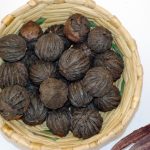
Yes!
Although black walnut contains Juglone, an organic compound toxic to plants, your chickens are safe.
So go ahead and feed them.
Can chickens eat walnut shells?
Rather not.
Because of their rough texture, walnut shells are a horrible choice for a chicken treat. The shells are so strict that your chickens can choke on them, so be careful.
Do chickens like Nuts?
Absolutely!
Most chickens would peck at these favorites thanks to being omnivores ― many chicken owners also confirm this.
Conclusion
So, can chickens eat walnuts? If I didn’t get an emphatic YES, re-read this article. If you did answer yes, congratulations, but let me wrap it all up:
If you feed nuts to chickens, you’re in for a new treat: walnuts.
A tasty treat and an excellent source of nutrients, walnuts provide good competition for other goodies: its rich in nutrients and fiber and pack a formidable energy boost.
You can try the regular walnuts or black walnuts ― both types are safe!
A species of deciduous trees, black walnut trees (where you will find your delicious black walnuts), are native to North America.
So if your chickens love this type, you know where to look!
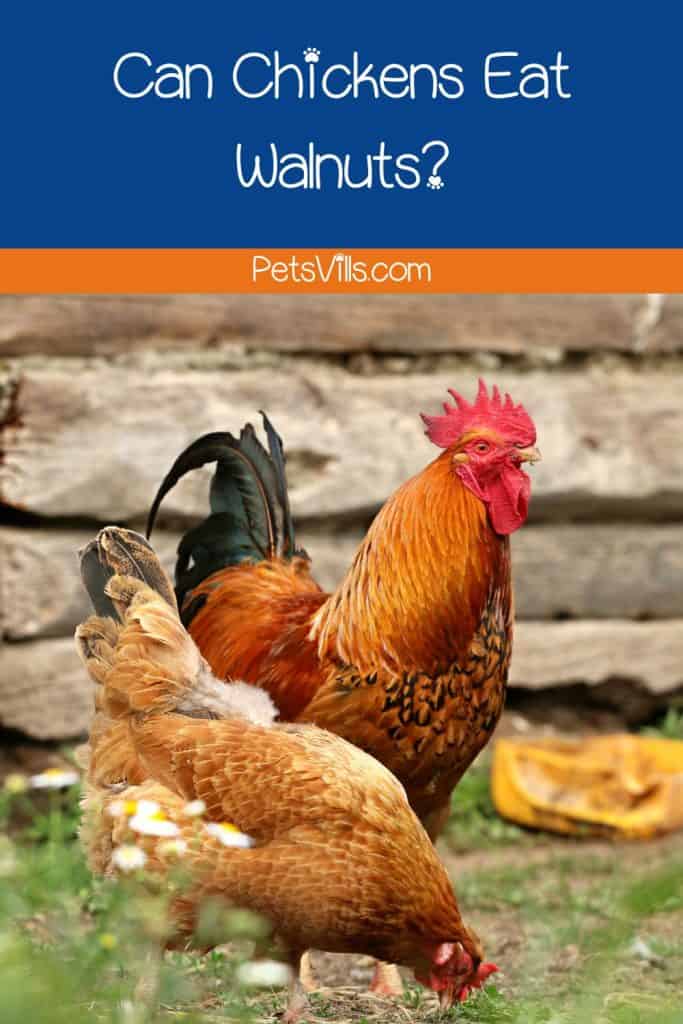
So, have you ever fed walnuts to your chickens? Let me know your experience!
Resources
- 1. McCulloch M. 13 Proven Health Benefits of Walnuts [Internet]. Healthline. Healthline Media; 2018. Available from: https://www.healthline.com/nutrition/benefits-of-walnuts
- 2. Molds on Food: Are They Dangerous? | Food Safety and Inspection Service [Internet]. www.fsis.usda.gov. 2013. Available from: https://www.fsis.usda.gov/food-safety/safe-food-handling-and-preparation/food-safety-basics/molds-food-are-they-dangerous
Alina Hartley is a small-town girl with a ginormous love of bearded dragons. It all started with Winchester, a baby bearded who was abandoned at the shelter by his former owners because of a birth defect that caused one front leg to be shorter than the other. Alina originally went to the shelter looking for a guinea pig, but one look at Winchester and it was love at first sight. From that day on, Alina has dedicated her life to learning everything she can about bearded dragons. She loves helping new beardie parents start their incredible journey with these magnificent reptiles.
Follow her on:
LINKEDIN
TWITTER.
Read her latest articles HERE
Learn more about her HERE.

